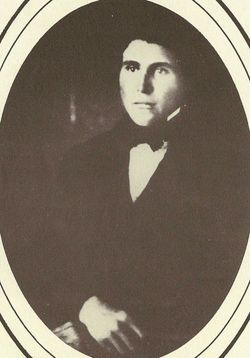Cornelius was baptized March 6, 1791 at the Reformed Church in Marbletown. He fought in the War of 1812, married Agnes Winfield of Orange County, NY, on January 24, 1816, and migrated to Oakland County, MI, in 1836. There he purchased more than 700 acres of land in Springfield Township where he built a house and a saw-mill which he operated until his death in 1867.
Cornelius Davis was born in 1791 in Ulster County, New York, and in young manhood served as a soldier in the War of 1812, having the rank of sergeant and being stationed at Staten Island. For his services his widow drew a widow's pension. In 1836 Cornelius Davis, with his family, including that of his son-in-law, Isaac Losee, started by way of the Erie Canal on what was then a very long journey, the objective point being Springfield township, Oakland county, Michigan. On account of the difficult transportation facilities beyond Detroit, the family brought only the bare necessities and on many occasions the good mother lamented the absence of useful household utensils, and the father felt the need of a tool or a bit of farm machinery left behind in the old home and not replaced in the new one for a long period. Mr. Davis was a man of excellent business ability and it was shown when he secured the whole of section 17, Springfield township, for himself as the first settler, knowing full well that such well situated land would soon attract other settlers, and in this view he was right. The second family to come to the neighborhood was that of Philip Frisby, who located on the west, and the second one was that of Timothy Jones. The first year the Davis and Losee families spent together in the log cabin, 26 by 30 feet in dimensions, which they soon erected. The land was cleared with the use of from three to five yoke of oxen and was put under cultivation by Mr. Davis and his family, although for some years many hardships had to be endured. Game was plentiful at first, but our subject recalls one time when the family bill of fare was reduced to potatoes and salt. He can recall the time when the Indians passed by their home on their way to Detroit to petition Governor Cass for rations. Fie also remembers an occasion when his mother was badly frightened with fear of wolves which could be heard howling in the timber and darkness had fallen before he could bring home the cows. The second year of pioneer life was the hardest, prior to the harvesting of any crops or the raising of any hogs or cattle. When potatoes were harvested, Mr. Davis hauled them to Detroit and there received 13 cents a bushel. Mr. Davis also can recall the visits of good Elder George Cornell, who made his pastoral visits to the pioneer neighborhood on horseback and held services in the log school house. Those were days when men and women were not judged by the clothes they wore and lads like our subject were eager listeners, in overalls and bare feet.
Cornelius Davis was married to Agnes Winfield, who was born in Orange County, New York, and was a daughter of Abram Winfield, and they reared this family: Andrews; Mrs. Mary Losee; John C, of Pontiac; Thaddeus C.; Jerome Z.; James H., of this sketch; Mrs. Sarah Burnham; and Isaac L. During the second year of his life in Michigan, Cornelius Davis erected a sawmill and during the year erected a comfortable plank house, a building which is still standing and in Davisburg used as a barn, the village covering a part of the 620 acres originally taken up by Mr. Davis. He was a man of much endurance and great industry, one of the representative pioneers of the township.
James H. Davis was nine years of age when he accompanied his parents to Oakland County. He was reared among pioneer surroundings, his education being obtained as occasion offered. He now owns 173 acres of the original tract of land taken up by his father, and farming is now carried on there by his son, Le Verne. The land is well situated for general farming and stock raising, and it has been the custom of Mr. Davis to devote much attention to high grade Calloway cattle which he exhibits at the various county and State fairs and which have won many premiums. He also raises fine sheep and hogs and his yield of potatoes and the various grains is far above the average. For many years he was very prominent as a farmer but has lately retired somewhat from activity.
Cornelius was baptized March 6, 1791 at the Reformed Church in Marbletown. He fought in the War of 1812, married Agnes Winfield of Orange County, NY, on January 24, 1816, and migrated to Oakland County, MI, in 1836. There he purchased more than 700 acres of land in Springfield Township where he built a house and a saw-mill which he operated until his death in 1867.
Cornelius Davis was born in 1791 in Ulster County, New York, and in young manhood served as a soldier in the War of 1812, having the rank of sergeant and being stationed at Staten Island. For his services his widow drew a widow's pension. In 1836 Cornelius Davis, with his family, including that of his son-in-law, Isaac Losee, started by way of the Erie Canal on what was then a very long journey, the objective point being Springfield township, Oakland county, Michigan. On account of the difficult transportation facilities beyond Detroit, the family brought only the bare necessities and on many occasions the good mother lamented the absence of useful household utensils, and the father felt the need of a tool or a bit of farm machinery left behind in the old home and not replaced in the new one for a long period. Mr. Davis was a man of excellent business ability and it was shown when he secured the whole of section 17, Springfield township, for himself as the first settler, knowing full well that such well situated land would soon attract other settlers, and in this view he was right. The second family to come to the neighborhood was that of Philip Frisby, who located on the west, and the second one was that of Timothy Jones. The first year the Davis and Losee families spent together in the log cabin, 26 by 30 feet in dimensions, which they soon erected. The land was cleared with the use of from three to five yoke of oxen and was put under cultivation by Mr. Davis and his family, although for some years many hardships had to be endured. Game was plentiful at first, but our subject recalls one time when the family bill of fare was reduced to potatoes and salt. He can recall the time when the Indians passed by their home on their way to Detroit to petition Governor Cass for rations. Fie also remembers an occasion when his mother was badly frightened with fear of wolves which could be heard howling in the timber and darkness had fallen before he could bring home the cows. The second year of pioneer life was the hardest, prior to the harvesting of any crops or the raising of any hogs or cattle. When potatoes were harvested, Mr. Davis hauled them to Detroit and there received 13 cents a bushel. Mr. Davis also can recall the visits of good Elder George Cornell, who made his pastoral visits to the pioneer neighborhood on horseback and held services in the log school house. Those were days when men and women were not judged by the clothes they wore and lads like our subject were eager listeners, in overalls and bare feet.
Cornelius Davis was married to Agnes Winfield, who was born in Orange County, New York, and was a daughter of Abram Winfield, and they reared this family: Andrews; Mrs. Mary Losee; John C, of Pontiac; Thaddeus C.; Jerome Z.; James H., of this sketch; Mrs. Sarah Burnham; and Isaac L. During the second year of his life in Michigan, Cornelius Davis erected a sawmill and during the year erected a comfortable plank house, a building which is still standing and in Davisburg used as a barn, the village covering a part of the 620 acres originally taken up by Mr. Davis. He was a man of much endurance and great industry, one of the representative pioneers of the township.
James H. Davis was nine years of age when he accompanied his parents to Oakland County. He was reared among pioneer surroundings, his education being obtained as occasion offered. He now owns 173 acres of the original tract of land taken up by his father, and farming is now carried on there by his son, Le Verne. The land is well situated for general farming and stock raising, and it has been the custom of Mr. Davis to devote much attention to high grade Calloway cattle which he exhibits at the various county and State fairs and which have won many premiums. He also raises fine sheep and hogs and his yield of potatoes and the various grains is far above the average. For many years he was very prominent as a farmer but has lately retired somewhat from activity.
Family Members
Advertisement
Records on Ancestry
Advertisement














